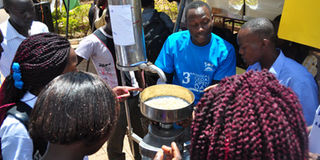Invention, Makerere’s new forte

One of the engineers explains his team’s invention during the open day at CEDAT. Photo by Edgar R. Batte.
What you need to know:
The university is teeming with talented young innovators on their way to becoming the engine that will drive Uganda’s economic growth in the future, creating much-needed jobs.
Makerere University is a hub of innovation lately and this could become its new strength. The exhibitions are as convincing as the works students showcase to the public.
The college of Engineering, Design, Art and Technology (Cedat) marked its open day with an exhibition on October 22. Under the theme ‘Job creation for Ugandan youth through technological innovation and advancement,’ students proved that there is more to theory. Makerere is strongly going practical.
The innovations ranged from bridge designs, electrical buses, art, to environmentally friendly options, among other smart ideas.
Joseph Kigozi, an engineering student, was one of the exhibitors and with his team they have an idea of a bridge design project, different from the conventional concrete and steel.
Advantages
He says: “This time we want to bring in the concept of designing bridges with timber. Timber has some advantages over concrete and steel like the weight, availability and cost which are all lower. We did a case study in places like Kanungu and found out that transport is difficult because of lack of bridges.”
He makes a case for the use of soft wood, which has a high density and can support up to 60 kilogrammes.
He adds: “I am sure if it is put in large volumes, it can support large trucks that are passing over it. The only construction which we have to put in is the one of maintenance and treatment of wood to protect it from wood and termite, the materials are available.”
Mr Henry Alinaitwe, the acting principal at Cedat, says: “Teaching, research and knowledge transfer partnerships, Cedat emphasises creativity and innovation aimed at solving problems in society. We see the open day as a celebration of sorts of this partnership (of college).”
He noted that the college has a big role in providing practical solutions to the challenges that communities face.
Mr Edwin Habaasa is project manager of the bridge-construction idea of this team and explains that they have looked at the transport sector as a major driver of our economy.
“The government talks of lack of funds to construct roads, but now we are looking at how we can bring in low costs of building bridges,” he argues.
On the same team is Ms Stella Namulindwa, an engineering student, who says the team is looking at producing different designs if their project is funded and implemented.
Mr Allan Obua is part of a team working on a water recycling system. “We named it Kekereza. It collects all the water you have used. It gets all the dirty water, runs it through the system and cleans it. We are saving you 30 per cent of your water bills. We are trying to tell people that they can save, you can recycle your water, and reduce the water bill,” Mr Obua says.
They estimate this machine to cost Shs500,000 when they go into production. He explains that they came up with the idea as students and are waiting on orders so that they can start earning off it.
Cottage industries
Mr Charles Swama and Mr Julius Mutebi have an idea of an oil extractor from jack fruit, groundnuts and sunflower seeds. “It is a home-based project because people grow groundnuts, sunflower, and jack fruits at their home. People throw them away after eating them,” the duo explains.
Patience Bukirwa is a researcher working on a bus project called Kayola, a local name to mean all-inclusive.
“We are building a bus powered by batteries charged by direct charging five hours for domestic power source and one hour on an industrial while the bus is on the road we have a solar panel to boost the battery charge to extend the distance. On a full battery charge it can go one and a 20-kilometre journey,” Bukirwa explains.
Her team comprises of mechanical engineers who work on material and structural, electrical engineers team which works on the power of the car, the type of battery and charging system and electronics team which works on the communication in the bus and the industrial design team which is responsible for how the bus will look.
The team was motivated to develop this idea because the world is trying cut down because of global warming. “We do not have the capacity to make all the parts like the batteries and tires. We use what we have in Uganda and buy what we don’t have from outside,” she adds.
Their production plan is to make buses for use in Kampala for the beginning then countrywide and eventually for the large East Africa.




